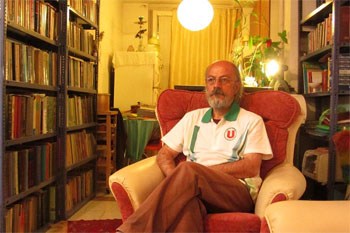
When I decided to introduce Iraj Ziayi to the Poetry Translation Centre, I knew the challenges we will face in translating his poetry. Deceptively simple in diction, Ziayi uses a complex web of imagery and personal allusions characterized by juxtaposing ordinary objects in surrealist settings. An ambiguity which is so natural that often goes unnoticed in Persian needed to be clarified for the purpose of translation. In order to make the right choice during the workshop, I had to offer my insider knowledge of the personal life and poetry of Iraj. Some of the imagery, e.g. the rock in the opening lines are geographically specific. Polish chair and Russian bicycle are culture-specific and might not be appreciated by English readers in the same way they are seen by readers in the original language. Polish chair is a kind of basic wooden chair introduced to Iranian homes and kitchens by a polish carpenter who was among the 150,000 polish refugees to Iran during the second world war. By the end of the war, majority of the refugees left Iran but some remained and left their cultural traces in the form of churches, synagogues, cemeteries, arts and crafts. A polish chair is immediately recognizable to an Iranian reader as a reminiscent of those tough years when shared suffering and exceptional hospitality led into a loving relationship between ordinary Iranians and Polish refugees; a relationship which Iranians cherish even today. Russian-made bicycles were also common in Iran during the sixties when Iraj Ziayi was growing up.
In the second workshop on Iraj Ziayi, we managed to complete 3 short poems. ‘In Rented Homes’ is again a poem about the relationship of man with objects written in second person narrative for more immediate effect. The narrator- poet describes old and worn out objects, a rusty coat hook, tired slippers and the wooden chair who (the chair is personified) has been anxiously waiting for his return home. The surprise ending changes the poem from a poem about objects to one about the poet himself. The poet is deeply related to all these objects but has no connection with the home containing these objects. He even doesn’t remember which rented home he is writing this poem in. This takes us to the second poem, ‘Centre of the Universe’. Again a poem about objects; familiar objects necessary for a basic survival. Objects so dear to the poet that he calls them the centre of the universe, yet again gathered in a home not belonging to the poet. ‘Children and the Sun’ was the poem we spent most of our time on. The ambiguous language and surrealistic images took us some time to agree on the exact references. As common in many other poems by Ziayi, the old straw chairs are capable of walking, spilling memories and sitting on the pavement. Having escaped the darkness of the house, they undergo a revival and rejuvenation in presence of children and the sun out on the pavement; a beacon of hope in the dark and dull world of worn out objects.
The poet has made very good use of assonance and internal rhyme in the original Persian. We tried to recreate as far as possible but part of the musicality was lost as in any poetry translation attempt.
Alireza Abiz

